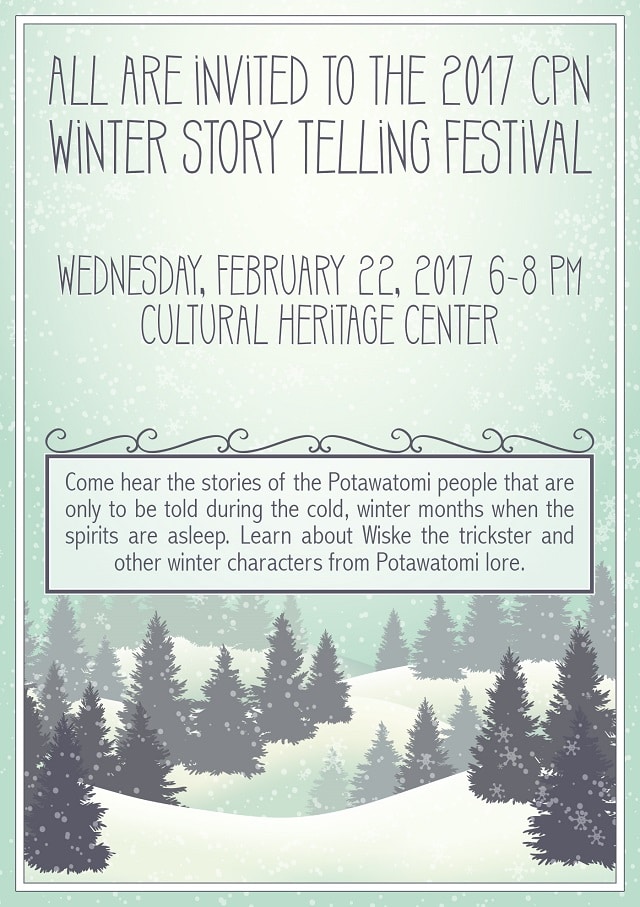
This month we will be hosting our fifth annual winter storytelling event on February 22 at the CPN Cultural Heritage Center from 6-8 p.m. As many of you may recall, traditionally we have a number of stories which can only be told in the wintertime – preferably when there is snow on the ground. Here in Oklahoma snow is very inconsistent from year to year. Our elders told us that in the winter the spirits are asleep so we could share certain stories. In particular stories which involve Nanabozho or Wiske the trickster. Sometimes Wiske would play jokes on our people and other times he would help us with the gift of fire or teach us a lesson.
Please mark your calendars for this event. We will have food and drinks so send us an email if you are coming to jneely@potawatomi.org so we can plan accordingly. But if you forget please don’t hesitate to pop on in and enjoy some fellowship with other Potawatomi and learn some stories which you can pass on one day to your own kids, grandkids, nieces and nephews.
In the Potawatomi worldview the passing of a winter was an indicator of a new year. We would follow the 13 moons and watch for changes in our environment to know that the seasons were changing. The coming of the thunders, the noise of the bullfrog and the return of the crane were all indicators that the winter season was coming to a close. Remember, if you’d like to learn the language at your own pace, visit our online courses for adults and children at language.potawatomi.org.
Winter language lesson
Ksenya mget zagech.
It’s cold outside. (Kuh sin yam get zah gech)
Explanation:
Ksenya-It is cold
mget-it is can be used without but often used with weather terms.
zagech-outside
Wi bonimget nyano gishgok.
It’s going to snow Friday. (We bone eemget neeyahno geesh goke)
Explanation:
Wi– future tense marker
boni– it is snowing
Mget means it is and can be used or left off.
nyano gishgok-On Friday
nyano from nyanen-5th (hence 5th day of the week) gishgek or gishek day
gishgok-locative to indicate on that day
Ngi-nodan mteno éwi gmowek.
I heard it only going to rain. (Nuhgee no dan mTino eh week moe wuck)
Explanation:
N-I
gi-past-tense marker
nodan– verb to hear it
Mteno-only (the m is semi-silent or hardly said)
é– it’s a fact used to stop the change from wi to wa with a verb in the conjunct
wi– future tense marker
gmowen-it is raining (one of the verbs which is animate in weather so doesn’t take the mget) gmowekconjunct for of the verb. Used often when two or more verbs are in a sentence.
Gmowen.
It is raining. (Mo wen)
Cho. Wi bonimget anake mkomis.
No it’s going to snow or ice. (Cho. Wee bone eemget ah nakay muhcomb ees)
Explanation:
Cho-no
wi– future tense marker.
wi bonimget-it will snow
anake-or some use nake
mkomis-icy. Some say mkwem for ice.
Shkena kyetnam kche boni mget.
Geeze it’s really snowing. (Shkay nah key yet nam kuchay bone eemget)
Explanation:
Shkena-geeze
kyetnam-really/intensely
kche-heavy or really or intensely attached to a verb
kche bonimget-it’s really snowing
Gon nene nwi-zhetomen.
Let’s make a snow man. (Goh ne nuhnay nuh wee zheh toe min)
Explanation:
Gon-snow
neneman nzhetomen-let’s make/create from the verb wzheton
Gnedwendam ne gon pkwakwet migadiyek?
Do you all want to have a snowball fight? (Guh ned win dahm nay goh ne puhkwahquit mee gah dee yuck)
Explanation:
Gnedwendam-you all want
ne-question from verb
nedwendan-want something
gon-snow
pkwakwet-ball
migadi-verb to fight
yek-you all do it in the conjunct form
